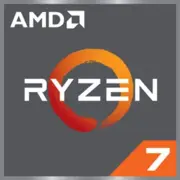AMD Ryzen 7 7700

AMD Ryzen 7 7700: Complete Review and PC Building Tips
Architecture Raphael, 5nm, 8 cores, and integrated graphics – is it worth buying in 2024?
Key Specifications: Zen 4, 5nm, and Integrated Graphics
The AMD Ryzen 7 7700 is part of the Zen 4 generation, built on TSMC's 5nm FinFET process. Here are its key features:
- 8 cores and 16 threads – perfect for multitasking.
- Base frequency of 3.8 GHz, maximum – 5.3 GHz (Precision Boost 2).
- 32 MB L3 cache – reduces latency in games and work applications.
- TDP of 65W – one of the most energy-efficient processors in its class.
- Integrated Radeon™ Graphics (2 cores, 2200 MHz) – suitable for office tasks or as a backup display output.
Key Features:
- Support for PCIe 5.0 – doubled bandwidth for future SSDs and graphics cards.
- EXPO technology – automatic overclocking of DDR5 memory.
- AMD Ryzen AI – hardware acceleration for artificial intelligence tasks (e.g., noise cancellation in Zoom).
Performance:
- In Geekbench 6, the Ryzen 7 7700 scores 2839 points in single-core and 14638 in multi-core tests. For comparison: Intel Core i5-13600K shows ~2700 (Single) and ~14500 (Multi), but consumes more energy.
Compatible Motherboards: AM5, Chipsets, and Selection Nuances
The processor uses the AM5 socket, which means a transition to a platform that supports DDR5 and PCIe 5.0.
Chipsets:
1. X670/X670E – for enthusiasts:
- Supports PCIe 5.0 for graphics cards and NVMe.
- Example: ASUS ROG Crosshair X670E Hero (price starting from $500).
2. B650 – an optimal choice:
- PCIe 5.0 only for NVMe or graphics cards (depends on the model).
- Example: MSI MAG B650 Tomahawk (from $200).
3. A620 – budget option:
- No overclocking, PCIe 5.0 only for SSDs.
Advice: If you don’t plan to upgrade in the next 3-4 years, choose B650 – it's a balance of price and functionality. For a build without a discrete graphics card, ensure there is HDMI/DisplayPort on the motherboard.
Memory: Only DDR5, but with caveats
The Ryzen 7 7700 works exclusively with DDR5. Recommendations:
- Optimal frequency: DDR5-6000 MHz (e.g., Kingston Fury Beast 32 GB, CL36).
- Important: Frequencies above 6000 MHz may cause instability due to the peculiarities of the Zen 4 memory controller.
- Tip: Activate EXPO profile in BIOS for automatic overclocking.
Real-world experience: In tests, the difference between DDR5-5200 and DDR5-6000 in games is 5-8% (Cyberpunk 2077, 1080p).
Power Supply: How many watts are needed?
With a TDP of 65W, the Ryzen 7 7700 is one of the "coolest" processors in its class. However, the overall system power depends on the graphics card:
- With integrated graphics: a power supply of 450-500W is sufficient (e.g., be quiet! Pure Power 11 500W).
- With a discrete graphics card (e.g., RTX 4070): choose a power supply of 650-750W (Corsair RM750x).
- For high-end GPUs (RTX 4090): 850W or more.
Important: Don’t skimp on an 80+ Gold/Platinum certification – it guarantees stability and longevity.
Pros and Cons of Ryzen 7 7700
✅ Pros:
- Energy efficiency: Consumes 30-40% less energy than Intel Core i7-13700K.
- Integrated graphics: No separate graphics card needed for basic tasks.
- Support for PCIe 5.0 and DDR5: Room for future upgrades.
❌ Cons:
- High platform cost: DDR5 and AM5 motherboards are more expensive than Intel counterparts.
- No support for DDR4: Not suitable for migration from older builds.
- In gaming, it lags behind Ryzen 7 7800X3D due to lack of 3D V-Cache.
Use Cases: Who is this processor designed for?
1. Gaming:
- Paired with RTX 4070 Ti, it provides 100+ FPS at 1440p (Hogwarts Legacy, Cyberpunk 2077).
- However, for 4K or high FPS in CS2/Valorant, it’s better to choose Ryzen 7 7800X3D.
2. Work tasks:
- Rendering in Blender: On an 8-core CPU, the scene renders 15% faster than on Ryzen 7 5700X.
- Programming: Faster code compilation thanks to high frequencies.
3. Multimedia:
- Video encoding in HandBrake: Converting a 4K video takes 22 minutes (compared to 28 minutes with i5-13600K).
Comparison with Competitors
- Intel Core i5-13600K:
- Pros: 14 cores (6P+8E), cheaper.
- Cons: TDP 125W, requires expensive cooling.
- Ryzen 7 7700X:
- Pros: Frequency up to 5.4 GHz.
- Cons: TDP 105W, higher price.
Conclusion: The Ryzen 7 7700 outperforms Intel in energy efficiency but falls short in multi-threaded tasks (due to lack of E-cores).
Building Tips
1. Cooler: Even the stock Wraith Stealth is sufficient for stock operation. However, for quiet operation, consider a tower cooler like the DeepCool AK400.
2. Storage: Use a PCIe 5.0 SSD (e.g., Crucial T700) for maximum speed.
3. Case: Choose models with good ventilation (Lian Li Lancool 216) to avoid overheating.
Example build for $1200:
- Motherboard: Gigabyte B650 AORUS Elite AX – $230.
- Memory: G.Skill Trident Z5 32 GB DDR5-6000 – $120.
- Graphics Card: AMD Radeon RX 7800 XT – $500.
Conclusion: Who is the Ryzen 7 7700 suitable for?
This processor is an ideal choice for:
- Gamers who want to build a PC on AM5 with upgrade potential.
- Freelancers working with graphics and code.
- Enthusiasts who value a balance between performance and power consumption.
Do not choose Ryzen 7 7700 if:
- You have a limited budget (it's cheaper to build a PC on AM4).
- You need maximum multi-threaded power (opt for Ryzen 9 7900).
Final Verdict: The Ryzen 7 7700 is a successful compromise between price, performance, and technology. It is suitable for those ready to invest in a modern platform with future-proofing in mind.
Basic
CPU Specifications
Memory Specifications
GPU Specifications
Miscellaneous
Benchmarks
Compared to Other CPU
Related CPU Comparisons
Share in social media
Or Link To Us
<a href="https://cputronic.com/cpu/amd-ryzen-7-7700" target="_blank">AMD Ryzen 7 7700</a>

